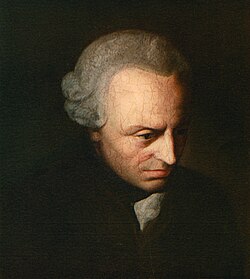| Part of a series on |
| Immanuel Kant |
|---|
 |
|
Category • |
Teleology is a philosophical idea where natural phenomena are explained in terms of the purpose they serve, rather than the cause by which they arise.
Kant's writing on teleology is contained in the second part of the Critique of Judgment which was published in 1790. The Critique of Judgment is divided into two parts with the first part Critique of Aesthetic Judgement and the second being Critique of Teleological Judgement. Within the first part Kant discusses and presents his ideas on aesthetics and within the second part Kant discusses how teleology has a role in our understanding of natural systems and the natural sciences.[1] Kant's moral philosophy is also concerned with ends but only in relation to humans,[i] where he considers it to be wrong to use an individual merely as means. The Critique of Teleology is concerned with ends in nature and so this discussion of ends is broader than in Kant's moral philosophy.[2]
Kant's most remarkable claims within his description of natural teleology are that organisms must be regarded by human beings as “natural purposes” in the Analytic of Teleological Judgement and his arguments for how to reconcile his teleological idea of organisms with a mechanistic view of nature in Dialectic of Teleological Judgement.[3]
Kant's claims about teleology have influenced both contemporary biology and the philosophy of biology.[4]
- ^ Kant, Immanuel; Guyer, Paul (2000). Critique of the power of judgment. Cambridge, UK: Cambridge University Press. ISBN 9780511338533. OCLC 182847379.
- ^ Parfit, Derek; Scheffler, Samuel (2011). On what matters. Volume one. Oxford: Oxford University Press. ISBN 9780191576706. OCLC 744616054.
- ^ Allison, Henry E. (2012). Essays on Kant. Oxford University Press. ISBN 9780191631528. OCLC 807061312.
- ^ McLaughlin, Peter (2001). What functions explain : functional explanation and self-reproducing systems. Cambridge: Cambridge University Press. ISBN 0511012470. OCLC 51028778.
Cite error: There are <ref group=lower-roman> tags or {{efn-lr}} templates on this page, but the references will not show without a {{reflist|group=lower-roman}} template or {{notelist-lr}} template (see the help page).
